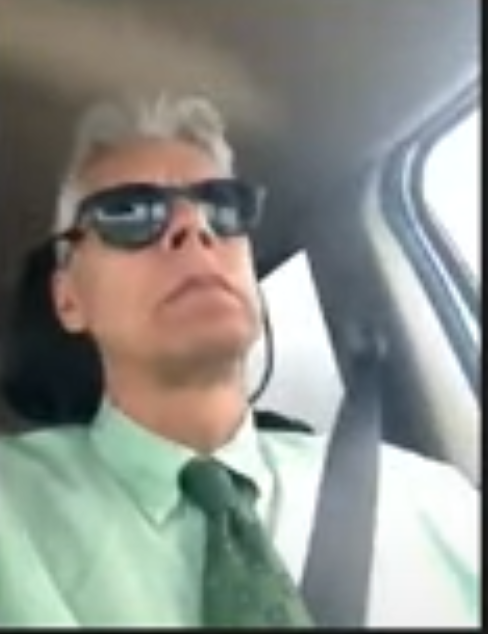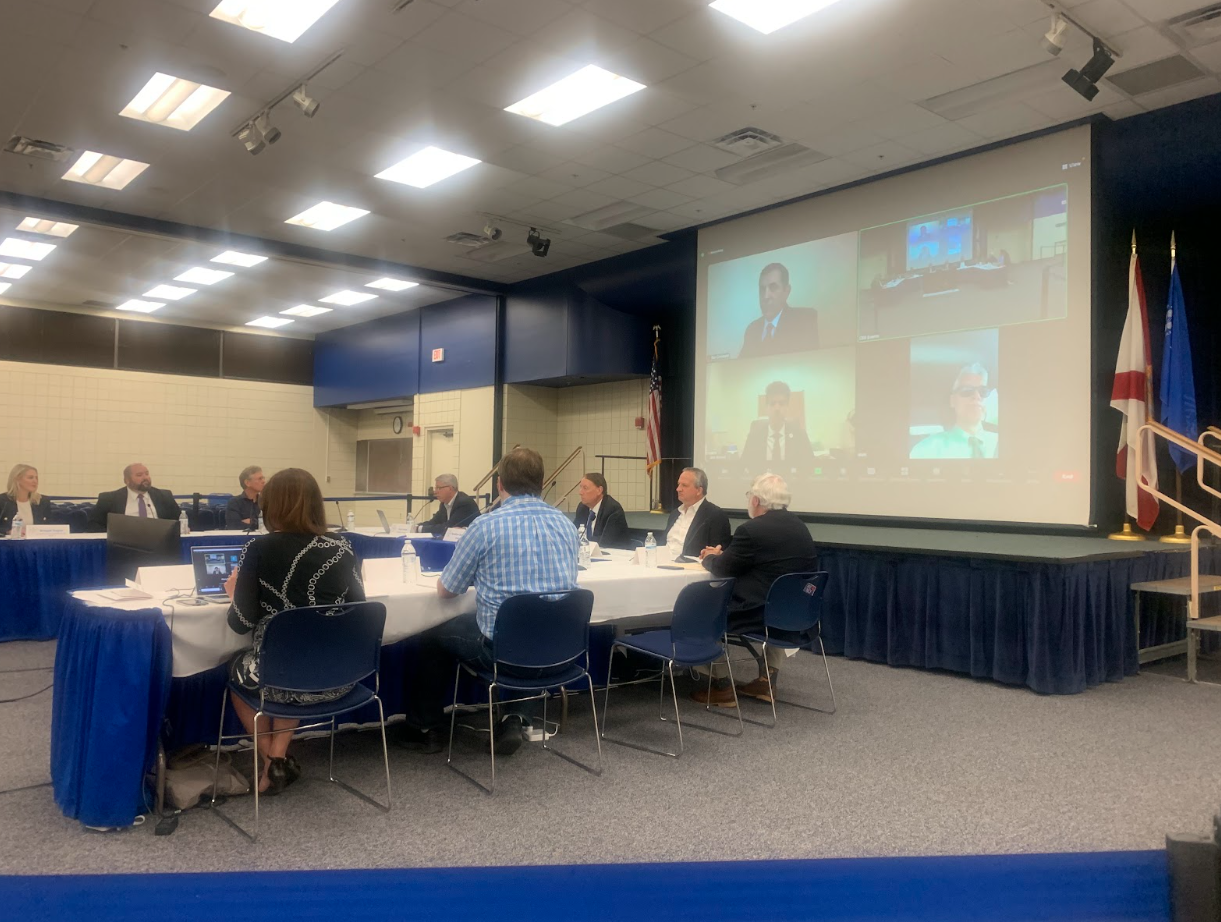The Presidential Search Committee met in the Sudakoff Conference Center on Apr. 27 for their first public meeting and announced their intentions to select a new president without a third party firm by the Fall 2023 semester. Since the dismissal of former President Dr. Patricia Okker by the newly appointed Board of Trustees (BOT) on Jan. 31, there has been unrest in the campus community as she was replaced by Interim President Richard Corcoran. The committee was selected by BOT Chair Debra Jenks in collaboration with Board of Governors (BOG) member Brian Lamb, and contains only one faculty representative while the 2020 Presidential Search Committee contained three.
The board consists of three trustees, including Chair of the Presidential Search Committee Matthew Spalding, Mark Bauerlein and Vice Chair of the BOT Ron Christaldi (‘93). The BOG representative is Adam Levine, who also participated in the 2020 search that resulted in Okker’s hiring.
The student representative is third-year transfer and off-campus student Joshua Broyhill, who is planning to intern with Rep. Joe Gruters (R-23), husband of newly hired Executive Director and Vice President of Advancement of the New College Foundation Sydney Gruters. For reference, during the 2020 presidential search, the student representative was then-New College Student Alliance (NCSA) President Sofia Lombardi who was chosen for the committee based on her student government position, and 74% of New College students live on campus.
The board also consists of Rep. Fiona McFarland (R-72); alum and superyacht lawyer Bob Allen (’78), who has previously claimed to be responsible for catalyzing the administrative changes at New College; Joe Jacquot, a partner at Gunster Law Firm who previously served as General Counsel to Gov. DeSantis; and Bridget Zeigler, Chair of the Sarasota County School Board and co-founder of “Moms for Liberty,” a conservative organization that has been accused of contributing to book banning in Florida. Also present was Associate Professor of Computer Science Matthew Lepinski, who resigned publicly during the Apr. 26 Board of Trustees meeting.

The meeting was called to quorum at around 1 p.m., led by Spalding, who thanked the participants for their presence.
“One of the first things I did when I was appointed a trustee was to learn as much as I could about the history of New College and its founding as a liberal arts college in Florida, founded by congregationalists on the principle of nondiscrimination,” Spalding opened. “This is a remarkable school, an absolute gem.”
Spalding then reiterated to the committee the importance of the opportunity to choose a new president.
“The opportunities for this place in particular, given where it is, given its history and its recent history, given what things are going on with its numbers, we’re all familiar with this, the opportunity right now is remarkable, to be perfectly honest, rather unlimited.”
Spalding then reiterated the responsibility and seriousness of the selection process: “We have a fiduciary responsibility as trustees, but I would suggest that you have a very powerful responsibility as well on this committee to advise the trustees. That opportunity and that responsibility all points back to one thing, which is the mission of the college. At the very first meeting, having read the history of this great place, I immediately saw that original mission. That’s still the mission. This is the Honors College of Florida. We want to restore that.”
Spalding stated a desire to ensure that the process was “transparent and robust” in order to acquire the “highest quality candidates.”
General Counsel and former Florida State Senator Bill Galvano, who was hired as an interim following the Jan. 31 BOT meeting, then launched into a recap of the presidential search process.
“Presidential search and selection is not an everyday thing, but it is commonplace within the state university system (SUS), and not all searches are the same,” Galvano explained. “Obviously they don’t all yield the same results, but there are certain strict requirements that we have to follow pursuant to the BOG regulations.”
Galvano then explained how each of the members of the committee was selected.
“In beginning this process, the chairman of the BOT, Debra Jenks, was tasked with consulting with the chairman of the BOG, Brian Lamb, to choose the people who are in this room and those that are on the Zoom presently. That ‘choosing’ also has specific boxes that need to be checked, that have been checked, in terms of the makeup of this board.”
The BOG stipulates that presidential search committees must contain three of that school’s BOT members, a BOG member, and an unspecified number of student, foundation and faculty representatives, none of whom directly report to the president. The BOG also suggests search committees should consider alumni, donors and community members, but does not require it. The 2020 Search Committee included three faculty representatives from the Natural and Social Sciences fields, as well as a staff member. The current committee includes one faculty representative and no staff members, but contains five alumni including Christaldi and Foundation representative Henry Smyth (‘76).
Galvano then laid out Spalding’s privileges as the committee’s chair, including the ability to choose to use a search firm in the process, and the responsibilities of the committee as a whole, including responsibility over “the web page and the collection of applicant information” and the creation of a feasible timeline for the process. One of the most important responsibilities, as explained by Galvano, is “establishing position criteria,” which will be reviewed by the BOT.
The committee is also responsible for the production of a marketing plan and “identify[ing] potential applicants.”
“It’s not just a passive duty that you have, to wait and receive, but this committee may have discussions about who potentially should be an applicant, and frankly, who should be recruited to be an applicant,” Galvano said. The committee will conduct interviews and eventually make a recommendation to the BOT about who should receive the position.
“It’s my job, and the Chair’s job, and really all of our jobs, to make sure we are complying [with] the strict letter and spirit of the law in this process as it goes forward for the benefit of the institution,” Galvano emphasized.
Galvano concluded by reiterating that Florida’s Sunshine Law is meant to keep government processes transparent. Generally, presidential search committee meetings are meant to be open to the public under the Sunshine Law, but Galvano explained that some meetings would be “shade meetings,” which are not open to the public. This is meant to protect the job security of potential applicants, who may face consequences in their current positions if it is uncovered that they are applying elsewhere. This exemption to public meetings was written into law in 2022. Records of these meetings, however, must still be kept.
Levine then added that according to BOG regulations, every member of the committee must sign a non-disclosure agreement (NDA), which had not yet been done at the time of the meeting.
Spalding then explained the highlights of the search committee’s charge, which includes guidelines for determining presidential candidates.
“It is asked to base these recommendations on position criterion adopted by the BOT with input from the campus community as well as the BOT’s established employment policies,” Spalding explained. “The last thing I will point to is at the end…pointing out that we are trying to conduct all of this with all of the academic and professional seriousness and appropriateness to this very important task.”
Spalding then established a prospective timeline for the search committee: “The goal is to conduct this search before the start of the Fall semester. It is not required to use a search firm, and because of our timeline and the fact that I think it is unnecessary, we’re not going to engage a firm to assist us in the process, which is to say we are going to use our own folks here, including our own people to design the materials we would send out as a search committee might do.”
For reference, Okker was recruited among four other candidates in the 2020 Presidential Search by the WittKeiffer firm. Each of these candidates came to campus to meet with students and faculty. The student body then completed an opinion survey on each of the candidates, which the BOT reviewed prior to selecting Okker for the position.
The committee is now in the process of reviewing qualification criteria and marketing plans, which are to be presented to and approved by the BOT. Spalding identified the BOG meeting in August as an appropriate deadline.
Levine then described selecting a president as “the most important job” for a BOT.
“To see the people around the table, it’s clear that the Chair of the BOG [Lamb] and the Chair of the BOT [Jenks] took this seriously,” Levine said.” These are heavy hitters sitting around this table, people that have been successful alums, graduates, faculty and esteemed people in higher education who have done a lot of great work throughout the country.
“We’ve gotta get through the uncertainty,” he continued. “Whatever the decision is, it needs to be made as quickly as practical so that the university can move on with its mission, because there’s a lot of potential applicants out there that might be concerned about applying until they know who’s going to be leading the university.”
Faculty representative Lepinski then asked about the timeline, seeking clarification on when the interview process would take place. Spalding responded that interviews would likely be held in July.
Christaldi then affirmed Spalding’s decision to not use a search firm, but asked for clarification on which internal staff would be assisting the committee with advertising and outreach to candidates. Spalding responded that the office of Associate Vice President and Interim Chief of Staff Christie Fitz-Patrick would be preparing materials for outreach and marketing of the position. Fitz-Patrick added that many of the materials used for the 2020 presidential search could be reused, and that Human Resources (HR) and Communications and Marketing would also be involved in the process.
“I think we’ve got sufficient experience and people here to do the work,” Spalding concluded before the meeting adjourned.
The next meeting, according to Spalding, will take place virtually sometime in the month of May. The committee can be reached PresidentialSearch@ncf.edu.

